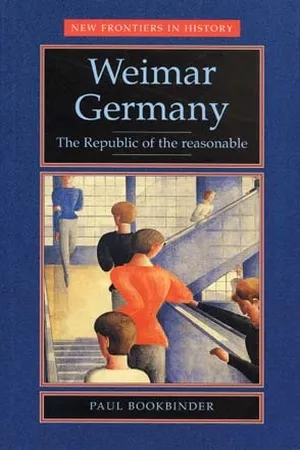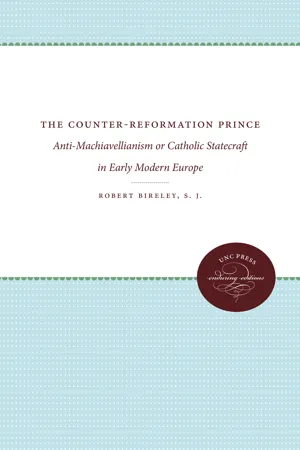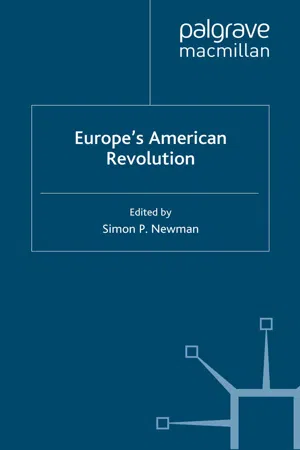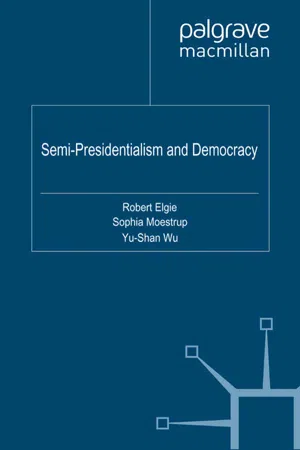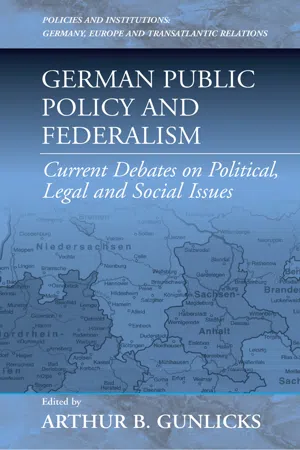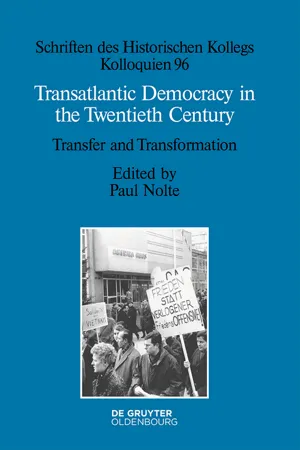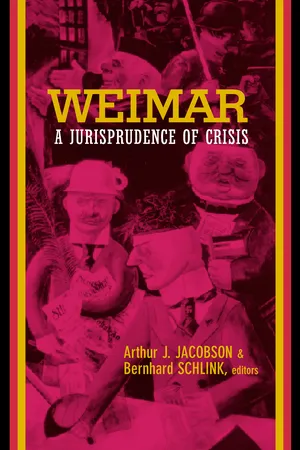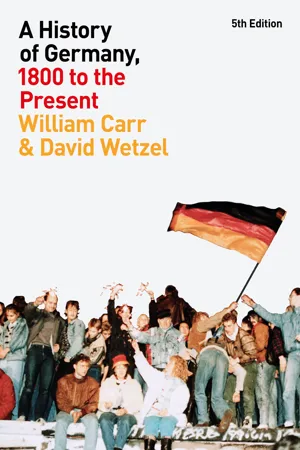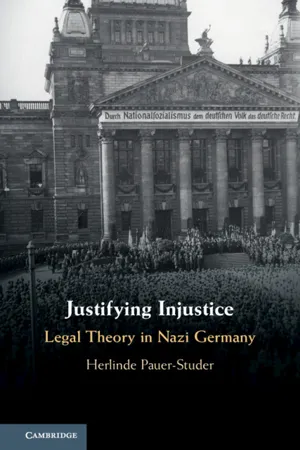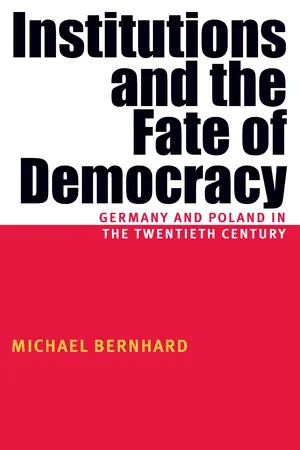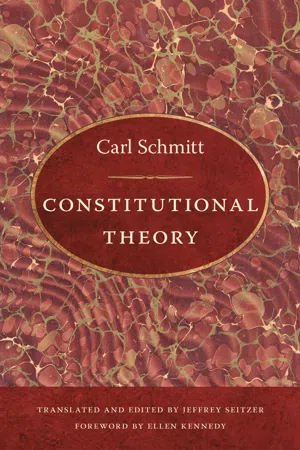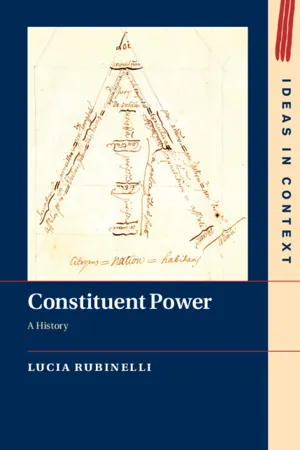History
The Weimar Constitution
The Weimar Constitution, adopted in 1919, established the parliamentary democracy of the Weimar Republic in Germany. It provided for a multi-party system, universal suffrage, and a bill of rights, making it one of the most progressive constitutions of its time. However, it faced challenges from both the political left and right, and ultimately failed to prevent the rise of the Nazi regime.
Written by Perlego with AI-assistance
Related key terms
1 of 5
12 Key excerpts on "The Weimar Constitution"
- eBook - PDF
Weimar Germany
The republic of the reasonable
- Paul Bookbinder(Author)
- 2024(Publication Date)
- Manchester University Press(Publisher)
1 Wilhelmine Germany on the eve of the First World War The Weimar Republic was born out of the chaos which followed Germany's defeat in World War I. While it is true, as H. Stuart Hughes has claimed, that the war changed everything, it is also true that what Germany became at the end of the war was inti- mately related to what Germany was before the great struggle.' Germany was a relatively new nation in 1914 unifying, after centuries of conflict, only in 1871 around the core of Bismarck's Prussia. The new nation was a strange constitutional structure, a federal monarchy, created by an association of former kingdoms still led by their royal families: "His Majesty, the King of Prussia ... , His Majesty, the King of Bavaria, His Majesty the King of Wi.irttemberg ... " 2 While the conservative Bismarck, as Chancel- lor of the Empire, chose to experiment with a lower legislative house elected by manhood suffrage (all men twenty-five years in age or over could vote), he loaded the constitution with provi- sions which severely limited the power of this Reichstag. Consid- erable power was left in the hands of the state (Land) governments, the largest of which by far, Prussia, retained its old three-class voting system based on taxes. Each of three strata of society could vote for representatives according to their own class. Each group of representatives voted separately in the Land- tag, and the vote of any two groups carried the day. Thus two groups of deputies representing the wealthiest and best educated segments of society could outvote the representatives of the far more populous lower classes. The federal constitution also provided for an upper legislative 5 Weimar Germany house, a Bundesrat, whose consent was needed for constitutional change and whose members were chosen by the state govern- ments. Prussia's block of seventeen delegates was sufficient on its own to prevent constitutional changes. - Available until 12 May |Learn more
The Counter-Reformation Prince
Anti-Machiavellianism or Catholic Statecraft in Early Modern Europe
- Robert Bireley, S.J., Robert Bireley S.J.(Authors)
- 2018(Publication Date)
- The University of North Carolina Press(Publisher)
According to the prevailing theory of democracy on which The Weimar Constitution was based, the composition of parliament should reflect the various social interest groups that constituted the nation as accurately as possible. Compared with this maxim, the idea that parliament was also responsible for creating viable governmental majorities receded into the background. The possibility that the constitutional system could be destroyed by ma-nipulation of the democratic process never occurred to the members of the National Assembly, particularly since protection of the constitution seemed to be secured through exceptional powers, such as the right to declare a state of emergency and to assume special executive power, that were granted to the president. At the same time, it proved impossible to reach a consensus on other guarantees, such as the Social Democratic demand for the exclusion of mem-bers of dynastic houses from being elected to the presidency. Only on the basis of a purely formalistic interpretation of the constitution could the fundamen-tal opposition between Left and Right be overcome. Those who criticize the republic for having failed to develop a concept of a combative democracy (streitbare Demokratie) fail to appreciate the political realities that attended the founding of the Weimar Republic. The popular election of the Reich president, who, in addition to his nor-mal ceremonial functions, was given the power to dissolve parliament and to appoint and dismiss the chancellor as well as the supreme commander of the Reichswehr, introduced an element into the national constitution that was alien to the basic tenets of classical liberal parliamentarism. By making it pos-sible for the president to appeal directly to the popular will in what amounted to a public referendum, Preufi had hoped to create a counterweight to what - eBook - PDF
- S. Newman(Author)
- 2006(Publication Date)
- Palgrave Macmillan(Publisher)
70 After the failure of 1849 the study of American constitutionalism fell into no less neglect than the ideas of modern, not to speak of radical constitutionalism. 71 America, democracy, and Germany: of failure and federalists It required the cataclysm of a lost World War to bring democracy to Germany, both in 1919 and then again in 1949. While the Weimar con- stitution represented a Germanized version of radical constitutionalism, akin to Pennsylvania, but clearly inspired by the broad diffusion of Rousseauian ideas, the Basic Law of the Federal Republic was marked by an anthropological pessimism reminiscent of the American Federalists, but also reflecting the German liberal tradition of distrusting the people. In both cases, immediate American influence was particularly relevant in that Wilsonian foreign policy and post-1945 American interests set the frame work for reconstructing German government. Yet even under Allied occupation that frame work was broad (democratization, a federal system, and a capitalist economy were key American demands) and the interests of the United States and the diverse German groups were suffi- ciently compatible to avoid fundamental clashes. 72 Rejecting the possibility of a ‘Räterepublik’, a republic of worker’s councils, liberals and Social Democrats opted for a representative system, which however would contain strong plebiscitary elements. Hugo Preuss, the principal architect of The Weimar Constitution, ‘con- ceived of democracy more as an organic unity of the people than as a system for the orderly resolution of conflict’ in the tradition of the Jacobin constitution of 1793, rather than the American Federalists. 73 However, it was primarily the Socialists who pushed for including a national referenda as well as a legislative initiative and recall, while Preuss thought direct democracy better suited to small states. 74 The Reichstag was to represent a proportional replica of the popular will by including splinter parties. - eBook - PDF
- Sophia Moestrup, R. Elgie, Y. Wu, R. Elgie, Y. Wu(Authors)
- 2011(Publication Date)
- Palgrave Macmillan(Publisher)
The new republic was built without preparation as an “improvising democracy” (Kolb 2002: 1). In the context of a power vacuum, a strong Reich President replacing the Kaiser as the head of state was the final result. 232 Yu-Chung Shen Furthermore, important powers were also bestowed on the Reich President to avoid the disorder of a multiparty parliamentary system like in France. Thus, the new republic was designed as a parliamentary system with a directly elected president; that is to say as a semi-presidential system. The framework of The Weimar Constitution Generally speaking, a new constitution is usually adopted either at inde- pendence or during a time of crisis. The Weimar Constitution is no excep- tion, it was developed at a time of internal revolt and foreign invasion. The victory of the SPD was most clearly apparent in the drafting of a new constitution. The election of the National Assembly, 4 which convened to create the new constitution, was held on January 19, 1919, and the SPD was the biggest winner in this election. The results are shown in Table 13.1. Although the SPD was disappointed not to have secured an absolute major- ity in the constituent body, it was able to ally itself with other centrist par- ties, the DDP (Deutsche Demokratische Partei, DDP) and the Ztr (Zentrum, Ztr), to form a coalition named the Weimar Coalition. This coalition controlled 78 percent, more than a two-thirds majority, of the National Assembly and led the drafting of the new constitution that was finally adopted on July 31, 1919 by a vote of 262 to 75. The next section will discuss the structure of the government and the relationship between the president, the parliament, and the chancellor. The Reich President According to Articles 41 and 43 of The Weimar Constitution, the Reich President was directly elected by the people every seven years. - eBook - PDF
German Public Policy and Federalism
Current Debates on Political, Legal, and Social Issues
- Arthur B. Gunlicks(Author)
- 2004(Publication Date)
- Berghahn Books(Publisher)
In the process of constitution making, the National Assembly had to discuss its proposals with the Commission of the States. It had to accept the “principle of Land representation” (Dorondo 1992: 6). The outcome of the deliberations of the Constituent National Assembly “bears throughout the stamp of compromises ” (Brunet 1922). Never-theless, The Weimar Constitution which was passed on 31 July 1919, established a Commonwealth “as unitary as possible without sup-pressing every trace of the federal regime” (Brunet 1922: 201). Thus, The Weimar Constitution was more unitary than the Con-stitution of Paul’s Cathedral in 1849. As in 1849 it was impossible to eliminate all federal elements, but despite the fact that the Preuss plan did not succeed in splitting up Prussia and dissolving the smaller states, the Commonwealth had constitutional means to force changes or exchanges of territory, fusions of states, or parceling of states. The Weimar Constitution departed from the constitutional organization of the German Confederation and the German Empire of 1871 which guaranteed the historic composition of its state mem-bers. It put forward the “principle of the mobility of frontiers.” Article 18 of the Constitution acknowledged the right of the Common-wealth (Reich) to force territorial changes for the common welfare of the German nation. Many of the States—Länder, as they were now called—were dis-satisfied with the provisions of the Constitution for the new German Commonwealth concerning the relationship between the German “Länder” and the Commonwealth. - eBook - PDF
Transatlantic Democracy in the Twentieth Century
Transfer and Transformation
- Paul Nolte(Author)
- 2016(Publication Date)
- De Gruyter Oldenbourg(Publisher)
Yet, this time around, the agenda behind such studies is not necessarily driven by a political mission but rather the inner workings of the academic field. Guided by the premise that Wei-mar’s demise was far from inevitable, recent research has presented a much more hopeful view of the Weimar Republic. Newer scholarship has argued that Weimar republicanism was much stronger than previously thought, which meant that its chances for survival were significantly greater. Although the call to avoid a teleo-logical interpretation of the Weimar Republic has become a hackneyed phrase, the strand of recent research committed to this perspective has contributed greatly to our understanding of Weimar Germany. Of particular note is the research on sym-bols and rituals, which were used and performed to celebrate the Constitution and to create a visual stage for Weimar republicanism. Largely focused on the tireless efforts of the Reichskunstwart (“federal art expert”) Edwin Redslob, this research has questioned the worn-out thesis, already formulated by contemporaries, that the Weimar Republic underestimated the integrative power of symbols and did lit-tle to evoke emotions in favor of Weimar democracy. For instance, in her study of the annual celebrations of Constitution Day, Manuela Achilles identifies a Weimar version of constitutional patriotism, which she derives from Gustav Radbruch’s notion of The Weimar Constitution as an “invisible fatherland”. 13 While this strand of research more indirectly than directly fosters a conflation between “Weimar democracy” and “democracy” tout court, recent studies on Weimar democratic thought expressly formulate a clear-cut analytical concept of democracy along the lines of liberal, parliamentary democracy. A landmark vol-ume, published in the year 2000, set the tone for much of this recent research. 14 Zaborowski (eds.): Leben, Tod und Entscheidung. Studien zur Geistesgeschichte der Weimarer Republik. - eBook - PDF
Weimar
A Jurisprudence of Crisis
- Arthur Jacobson, Bernhard Schlink, Arthur Jacobson, Bernhard Schlink(Authors)
- 2001(Publication Date)
- University of California Press(Publisher)
And in Germany, too—a shame that cannot be denied — there exist corrupt sen-timents that degrade the idea of the Reich, because they do not like its pres-ent constitution, that even attempt to uproot the idea of the Reich, because they are more concerned with particularistic special interests than in the weal and woe of the nation. We know this; but we also know that these Reich-corrupters are just a small crowd and that, as long as we others are unified against them, as long as the overwhelming majority of the German people wants the Reich and the national unity it embodies, the French will not achieve their goal, this old and constantly renewed goal—not even with the help of the eastern vassal states that have been built up behind us so that they can attack at the right moment in support of their great friend. The Reich must remain ours, and it will remain ours so long as we are united. I would like to speak today about the political type, the legal essence of our Reich, as represented by its current basic law, The Weimar Constitution of 11 August 1919; and I would like—with some doubts as to the correctness and completeness of the title—to describe my task with the words: Three Guiding Principles of The Weimar Constitution. Twice in a period of seventy years the German people, in contrast to its deeply rooted propensity for being led from above by historically legitimized power, has roused itself to take its fate into its own hands, to help itself out of the difficulties of the time, to reform its state from the bottom up, and to do all this itself through a freely elected constitutional assembly, a national as-sembly. The first time, what the national will had intended was unsuccessful; GERHARD ANSCHÜTZ 133 it is well known that the meeting of the National Assembly in Paul’s Church in Frankfurt created a Reich constitution, but not a Reich that could be served by this constitution. - eBook - ePub
- William Carr, David Wetzel(Authors)
- 2023(Publication Date)
- Bloomsbury Academic(Publisher)
Contrary to widespread expectations, the Socialists failed to secure an absolute majority; there had been some reaction against socialism on account of Spartacus Week, and women, voting for the first time, showed an inclination to support the parties of the status quo. Even so, the Socialists secured 187 of the 461 seats, with 11.5 million votes of which 165 were won by Majority Socialists and only 22 by Independents, a testimony to the power and efficiency of the Majority Socialist electoral machine, which unfairly depicted the Independents as fellow-travelling Communists. The Centre won ninety-one seats, the Democrats seventy-five, the German Nationalists forty-four, and the Populists nineteen. The central council of workers’ and soldiers’ councils handed over its powers to the assembly without demur. On February 10, 1919, Ebert was elected first president of the Republic by 277 votes to 51. He immediately asked the Majority Socialists, as the largest party in the assembly, to form a government. Having no overall majority, the Socialists needed allies and found them in the Centre and Democratic Parties. The new government was headed by Chancellor Philipp Scheidemann and consisted of six Socialists, three Centrists, and three Democrats. This was the famous Weimar Coalition, so called because the assembly met in the new theater at Weimar, conditions in Berlin being too unsettled to risk meeting in that city.The Weimar Constitution—an OverviewThe assembly turned at once to the task of drafting a new constitution. In November 1918 Hugo Preuss, a left-wing liberal and well-known professor of law, had been appointed secretary of state by Ebert and asked to prepare a draft constitution. Preuss set out to combine democracy and parliamentary government with a high degree of centralization, for left-wing liberals had always held the unitary state in high esteem. He was also convinced that the unity of the Reich would be endangered in the troubled days that lay ahead. In its time the document was celebrated for consistency.Most controversially, the draft called for the dismemberment of Prussia—a state which left-wing liberals had always suspected as a bastion of particularism—and the complete reorganization of Germany into twelve roughly equal administrative units (fourteen with German Austria and Bohemia-Moravia). These drastic proposals aroused fierce opposition, especially in Bavaria, Württemberg, and Baden. In the end a much revised version of the Preuss draft was adopted in the assembly by 262 votes to 75.What emerged from the debates was a compromise between the full-blooded unitary state, favored by Preuss, and the old Bismarckian structure, which recognized the existence of individual states. The unitary principle was implicit in the first clause of the new constitution: “The German Reich - eBook - PDF
Justifying Injustice
Legal Theory in Nazi Germany
- Herlinde Pauer-Studer(Author)
- 2020(Publication Date)
- Cambridge University Press(Publisher)
The office of the Reich President thus symbolized unity and stability, whereas the govern- ment inherited and reflected the conflictual parliamentary power play. This understanding of the normative foundations of the Weimar Republic’s two major political institutions was prominent in conservative and right wing circles. Combined with the still widespread endorsement of a hierarchical state (Obrigkeitsstaat) in Germany, the constitution’s guaran- tee of extensive presidential powers lent itself to the rise of authoritarianism. Mommsen, Wolfgang J., Max Weber and German Politics 1890–1920, transl. by Steinberg, Michael S. (Chicago and London: The University of Chicago Press, 1984), pp. 332–389; Bollmeyer, Heiko, Der steinige Weg zur Demokratie. Die Weimarer Nationalversammlung zwischen Kaiserreich und Republik (Frankfurt am Main: Campus, 2007), pp. 222–228. 28 In his history of The Weimar Constitution, Willibalt Apelt writes that in the consultations concerning the future structure of the Reich “some suggestions by the well-known sociologist Max Weber received particular attention,” for example, “that the Reich President should, just as in the United States, be elected directly by the people so that he would have special authority toward the parliament.” Apelt, Geschichte der Weimarer Verfassung, p. 57. Apelt adds that Weber managed to win Preuss’s support for this proposal, although Preuss had initially tended to leave the President’s election, as in France, to the representatives of the people. For a concise discussion of the debate between Weber and Preuss see also Kennedy, Ellen, “Introduction: Carl Schmitt’s Parlamentarismus in Its Historical Context,” in Schmitt, Carl, The Crisis of Parliamentary Democracy, transl. by Kennedy, Ellen (Cambridge, MA: The MIT Press, 1988), pp. xiii–xlix. 29 Preuss, “Rede über die neue Reichsverfassung (1919),” p. 590. 28 from the weimar republic to the third reich - eBook - PDF
Institutions And The Fate Of Democracy
Germany And Poland In The Twentieth Century
- Michael Bernhard, Michael H. Bernhard(Authors)
- 2010(Publication Date)
- University of Pittsburgh Press(Publisher)
Given the experience of Nazism and war, the younger generation of Germans was only weakly represented. The average member of the Parlia-mentary Council was fi fty-four years old. All of them had directly experienced Weimar and its failure, and several of them had actually been members of the constituent National Assembly in (Friedrich a, ; Eschenburg , – ). Thus, the process of institutional choice in this case seems marked by what has been described as “learning from history” ( Lehren aus der Geschichte ) (Morsey , ). ²⁶ In writing this part of the constitution, the chairman of the Main Commit-tee, Carlo Schmid, had an important in fl uence on many articles. He too was strongly in fl uenced by Weimar’s failures and felt that the committee had to avoid repeating its mistakes. He felt that the Weimar president had been too powerful and that the chancellor needed to be strengthened. He strongly op-posed provisions that would have allowed individual ministers to be removed by the legislature. He felt that the legislature needed to confront the government over its policies and not to attack its personnel. He also was a strong supporter of strengthening the chancellor and government through a “constructive vote of no con fi dence “ (Adenauer , – ). Following the war, there was a consensus that the strength of the president and the corresponding weakness of the chancellor had been one of the reasons for the instability of the Weimar system (Niclauss , – ). In the delibera-tions at Herrenchiemsee, representatives of the three largest parties, Menzel (SPD), Heuss (FDP), and Adolf Süsterhenn (CDU), all spoke strongly in favor of parliamentarism. The conference report also called for a strong parliament-based chancellor as the head of government. It provided two options for the head of state, a federal president or a collective presidium. - eBook - PDF
- Carl Schmitt, Jeffrey Seitzer(Authors)
- 2008(Publication Date)
- Duke University Press Books(Publisher)
Te ambiguous word “fundamental” receives the sense of something absolutely unbreakable. For example, that a parliament can never declare itself a permanent body constitutes such a fundamental principle. If the legislature, specifcally the parliament, could change that, there would no longer be any security, etc. Cromwell’s eforts remained unsuccessful. Te modern practice of the written constitution frst begins with the English colonies in North America. As they separated themselves from England and declared themselves independent states, they formulated their constitutions in written form. A “congress” in 1776 prompted all these states to undertake these actions. Since the French Revolution of 1789 and the frst modern written constitutions on the European continent, the 1791 French constitution, constitutions with a typical content occurred regularly during the founding of states and after revolutions, the scheme of which Ideal Concept of the Constitution 92 till now corresponded mostly to the basic schema, discussed below (§ 12, p. 126), of the bourgeois Rechtsstaat with basic rights and separation of powers. Te Weimar Constitution also still follows this schema. Te Soviet Republic constitution of 11 July 1918 abandoned the schema of the bour-geois Rechtsstaat and established a new type of constitution, the socialistic soviet constitution. III. Te ideal concept of the constitution dominant today still corre-sponds to the bourgeois Rechtsstaat’s ideal of a constitution. When one looks past Bolshevist Russia and fascist Italy, one can say that this ideal concept is still valid in most [41] states of the globe. Te peculiarity of its ideal of a constitution is that an organization of the state is undertaken with a perspective that is critically and negatively disposed toward state power—protection of the citizen against the misuse of state power. Not so much the state itself as the means and methods of its control are orga-nized. - eBook - PDF
Constituent Power
A History
- Lucia Rubinelli(Author)
- 2020(Publication Date)
- Cambridge University Press(Publisher)
More to the point, arguments aimed at moving away from parliamentar- ism towards a plebiscitary presidential regime were already widely discussed in the mid-1920s, as was the case of debates about the attribution of dictatorial power to the president. See H. Mommsen, The Rise and Fall of Weimar Democracy, pp. 256–9, p. 362. 107 Ibid. 108 Ibid. 134 The Weimar Republic cases of emergency. It also means that it can finally put an end to the problem raised by positivist interpretations of the constitution, which were unwilling to distinguish between the absolute part of the constitutional text – the fundamental decision at its origins that could not be changed without completely overthrowing the decision of the constituent power – and the relative part of the constitution – the specific norms which by contrast could be changed while remaining within the limits of the con- stituted powers. The way in which the president avoided this problem was by offering himself as the representative and guardian of the initial decision of the constituent power and, in so doing, protecting the absolute constitution from all attempts to change it through legal revolutions. 109 In other words, for Schmitt the president is the guardian of the intangible will of the nation as expressed through the constituent power, and this is in virtue of his capacity to represent the nation as a whole. From all the above, it follows that the president of the Reich is, for Schmitt, the dictatorial figure who, in the context of Weimar, represented and embodied the constituent will of the nation. As a result, the president had the task of interpreting the will of the constituent power. In so doing, the figure of the president was a constant reminder of the omnipotent and inalienable presence of the constituent power, behind and beyond the constitutional text, which, in turn, gave the president access to extraordin- ary powers.
Index pages curate the most relevant extracts from our library of academic textbooks. They’ve been created using an in-house natural language model (NLM), each adding context and meaning to key research topics.
